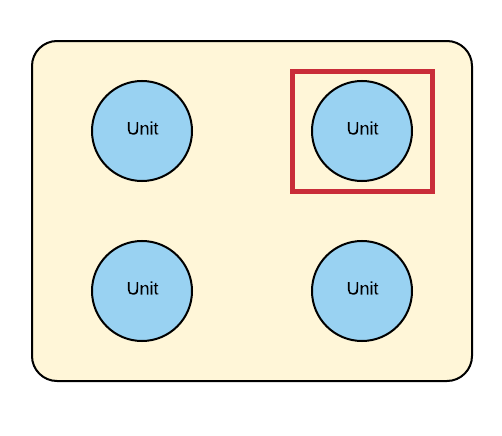Unit Testing
Fast, deterministic tests that verify individual functions, methods, or components in isolation with test doubles for dependencies
3 minute read
Unit tests are deterministic tests that exercise a discrete unit of the application, such as a function, method, or UI component, in isolation to determine whether it behaves as expected.
When testing the specs of functions, prefer testing public API (methods, interfaces, functions) to private API: the spec of private functions and methods are meant to change easily in the future, and unit-testing them would amount to writing a Change Detector Test, which is an anti-pattern.

The purpose of unit tests are to:
- Verify the functionality of a unit (method, class, function, etc.) in isolation
- Good for testing hi-complexity logic where there may be many permutations (e.g. business logic)
- Keep Cyclomatic Complexity low through good separations of concerns and architecture
Principles
- Unit tests are low-level and focus on discrete units of the application
- All dependencies are typically replaced with test-doubles to remove non-determinism
- Unit tests are fast to execute
- Test Suite is ran after every code change
Recommended Best Practices
- Run a subset of your test suite based on the part of the code your are currently working on
- Following TDD practices plus the watch functionality of certain testing frameworks is an easy way to achieve this
- Pre-commit hooks to run the test suite before committing code to version control
- Verification during PR and during the CI build on the HEAD to verify that earlier verification happened and was effective.
- Discourage disabling of static tests (e.g. skipping tests, ignoring warnings, ignoring code on coverage evaluation, etc)
- Write custom rules (lint, formatting, etc) for common code review feedback
Resources
Examples
Recommended Tooling
| Platform | Tools |
|---|---|
| Android | Framework: JUnit5 Assertion: Google Truth |
| iOS | XCTest |
| Web | Framework: jest Assertion & Mocking: expect (jest), jest-dom, others as necessary Code Coverage: instanbul/nyc (jest) |
| Java BE | Framework: TestNG, JUnit5 Code Coverage: sonar (sonarlint) Mocking: Powermock, Mockitoi Assertion: REST Assured, Truth, TestNG/JUnit5 |
| JS/node BE | Framework: jest Assertion & Mocking: expect (jest) - generic, supertest or nock - http server endpoint, apollo - graphql server testing Code Coverage: instanbul/nyc (jest) |